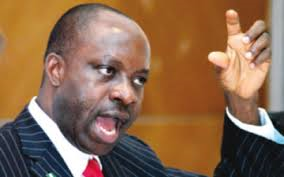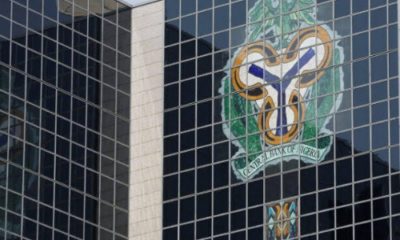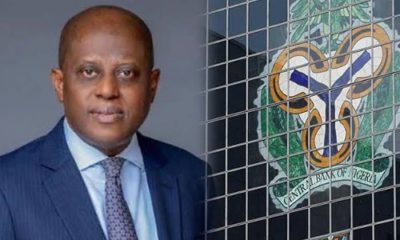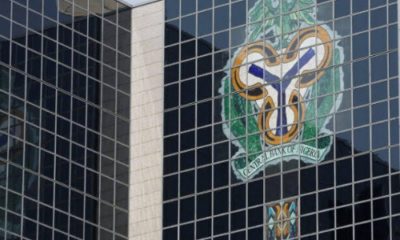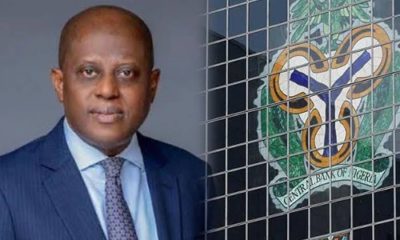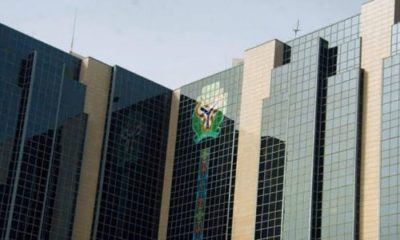Finance
Soludo carpets President Jonathan over reaction on missing N30 trillion
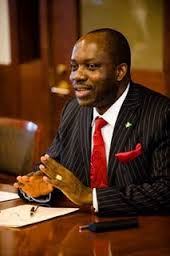
Former governor of Central Bank of Nigeria (CBN), Charles Soludo is setting the record straight about his allegations that more than N30 trillion has been lost, stolen or unaccounted for under Ngozi Okonjo-Iweala’s watch in the last four years.
Soludo is expatiating on his claims in response to president Goodluck Jonathan‘s response on the matter, in which he stated that Soludo’s claims are illogical. Jonathan’s statement is contained in a ThisDay article titled, “Jonathan Replies Soludo over missing N30 trillion claim,” .
In the article, Jonathan stated:
“Not too long ago I read in one of the papers, I think Vanguard, that former chief economic adviser to President Obasanjo who also went to become a CBN governor… Soludo is a professor and first class material. Yes, making a first class in economics, he is a brilliant person. His secondary school records are fantastic. So by all standards he is a brilliant person. So the Vanguard wrote that he accused Ngozi; that N30 trillion was stolen under the watch of Ngozi in four years,” the president said.
“Ngozi became a finance minister, let’s say from 2011 till date. From that time till now, our annual budget is between N4.3 trillion and N4.9 trillion. So even if you put all together, it is about 18 plus trillion naira, and not 30 trillion. The budget for these four years is less than N20 trillion, but Soludo said that under Ngozi’s watch they stole N30 trillion. This is in the papers, social media, stored in the clouds and will continue to be there. And when you type it in it will come out that during President Jonathan’s time they stole N30 trillion.”
Read Soludo’s response to Jonathan:
My attention has been drawn this morning to an article entitled: “Jonathan Replies Soludo over “missing N30 trillion” claim”— extracting from Mr. President’s interview as published by Thisday newspaper.
ThisDay quoted Mr. President as saying that “Soludo said that under Ngozi’s watch they stole N30 trillion” but that since the sum of the federal budget over the last four years was less than N30 trillion, such an amount could not have been “stolen”.
According to the President, “it is all political”. I had earlier stated that I would not make further comments on the issues until probably after the elections but since Mr. President has decided to join the fray, I am constrained to make a further brief clarification.
For me, President Jonathan is a gentleman and a friend but I have a fundamental disagreement on his management of the economy. On the issues at stake, I believe that the pressures of office and the hectic electioneering campaigns have not allowed him time to read my articles or that his staff have not explained the contents to him hence he totally missed the point in his comments. For the avoidance of doubt, let me clarify as follows:
1. In my article entitled “Ngozi Okonjo-Iweala and the Missing Trillions”, I presented some rough calculations covering: oil theft, money that ought to accrue to stock of foreign reserves, unbudgeted oil subsidy payments, customs duty waivers, leakages through the self-financing government parastatals, unremitted sums by NNPC, etc.
I concluded that section of my article by noting that: “I have a long list but let me wait for now. I do not want to talk about other ‘black pots’ that impinge on national security. My estimate, Madam, is that probably more than N30 trillion has either been stolen or lost or unaccounted for or simply mismanaged under your watchful eyes in the past four years”.
It is evident that the monies I referred to are “off-budget”. These are monies that did not make it to the budget. I find it funny that the Government deliberately avoided the issues raised above but instead has sought to divert attention by focusing on the “federal budget”.
Let me state for the record that I believe that the amount of resources that are either stolen from the economy or out-rightly mismanaged by government far exceeds the federal budget per annum.
Ours is about a N100 trillion economy, and I will be shocked if the government pretends that it does not know that currently about 10% of the GDP falls into a ‘black hole’ on annual basis.
We have not added figures based on counterfactual analysis such as the cost to the aggregate economy of bad or misguided economic policy. For example, in today’s Thisday newspaper, a headline news reports that “Aliko Dangote, Africa’s Richest Man, Loses $7.8 Billion as Naira, Stocks Plunge” while reporting that “In dollar terms, the devaluation has knocked more than $40 billion off the value of Nigeria’s economy”. Of course, most people predicted that oil prices would soon fall but we were caught unprepared, and today, the parallel market exchange rate is N225 to the dollar.
Thus, the kind of analysis in today’s Thisday is just one little example of the kind of collateral damages–‘costs’ or ‘losses’– that mismanagement foists on the system. To repeat, my article did not focus on the federal budget: the mismanagement of the consumption budget and its unprecedented debt accumulation (with low value-for-money expenditures) are entirely different matters.
3. What I found particularly disconcerting as a Nigerian from the comments I read is the fixation to validation from the World Bank. According to Mr. President, “we asked the Minister how her colleagues at the World Bank saw the accusation”. I shook my head in disbelief. It is instructive that no one asked what Nigerians thought or ‘how Nigerians saw it’ but rather what was important to government was the impression of the World Bank. If this is the mind-set of our leaders, then ordinary citizens have real cause to worry.
Well, I have read several editorial comments of Nigerian media and they do not agree with the ‘impression’ of the World Bank official. I read a similar comment by a high government official stating that World Bank officials and CNN had told them that government was doing well and therefore who else could question them.
But neither the World Bank nor CNN conducts comprehensive independent surveys on the economy— they comment based on the data they are given— and their subjective “opinions” cannot substitute for hard facts.
The World Bank is not a statistical agency. I can provide a long list of countries that World Bank reports praised as ‘star performers’ and they slumped into deep crisis almost immediately after. Check out the World Bank and IMF reports on the US and other countries’ economies shortly before the unprecedented global financial and economic crisis in fifty years (the Great Recession of 2008/09).
Actually for many countries once they start getting such ‘praises’, then perceptive officials begin to worry. Nigeria is probably the only country where its government officials quote the World Bank while ignoring data from its own statistical agency!
A serious concern is that while government relies on external validation (opinion) as ‘proof’ of its performance, it is selective in the process—accepting the positive ones and disparaging the negative ones. Our recent exchanges illustrate the point. In my first article (26th January): “Buhari Vs Jonathan: Beyond the Elections”, I argued that “the economy seems to be on auto pilot, with confusion as to who is in charge, and government largely as a constraint.
There are no big ideas, and it is difficult to see where economic policy is headed to. My thesis is that the Nigerian economy, if properly managed, should have been growing at an annual rate of about 12% given the oil boom, and poverty and unemployment should have fallen dramatically over the last five years”. No one has credibly challenged the above, except what the Financial Times of London described as a “furious response by the Minister”. But, the influential Economist Magazine of London and New York Times agreed with us. According to the Economist editorial (7th February, 2015):
“… as Africa’s biggest economy stages its most important election since the restoration of civilian rule in 1999, and perhaps since the civil war four decades ago, Nigerians must pick between the incumbent, Goodluck Jonathan, who has proved an utter failure, and the opposition leader, Muhammadu Buhari….
The single bright spot of his rule has been Nigeria’s economy, one of the world’s fastest-growing. Yet that is largely despite the government rather than because of it, and falling oil prices will temper the boom. The prosperity has not been broadly shared: under Mr Jonathan poverty has increased. Nigerians typically die eight years younger than their poorer neighbours in nearby Ghana”. I gave the Government an “F” grade on economic management, and the Economist described its performance as “utter failure”.
The Economist also basically agreed with me that the re-basing of the economy and its observed ‘growth’ have nothing to do with government policy. Again, government has not credibly challenged the above or is the Economist’s view also ‘all political ’? Government simply waved it off. My point is that if Government has to rely on the “impressions” of external bodies, then it should be consistent and comprehensive.
4. In conclusion, let me re-state that I firmly stand by my earlier statements. These are weighty statements which I weighed carefully before issuing. I appreciate that this is an election time and so attempts would be made to trivialize, or either play politics with, or divert attention from, them. In a serious society, we should have had a good debate on these matters as they could provide some of the building blocks in trying to pick the pieces after the elections.
Part of our citizen duty in a democracy is to raise such issues and demand for answers. In the meantime, I grant that our leaders are busy with campaigns but these issues won’t go away until we have a transparent resolution. Be assured that after the elections, we will be back with even more questions!
Banking
CBN Denies Currency Devaluation

The Central Bank of Nigeria (CBN) has refuted claims of devaluing the.
Earlier reports suggested that the CBN had devalued the Naira, lowering its exchange rate from N631 to the dollar, compared to the previous day’s rate of N461.60 at the Importers and Exporters (I&E) window.
However, the Central Bank of Nigeria (CBN) released a statement on Thursday through its Acting Head of Corporate Communications, Dr. Isa Abdulmumin, categorizing the report as false information.
In the statement titled ‘CBN Has Not Devalued The Naira’, he said the attention of the apex bank was drawn to the news report by an Abuja based newspaper edition of June 1, 2023, titled “CB Devalues Naira To 630/51”.
However, the CBN stated categorically that the news report was replete with outright FALSEHOODS and destabilizing innuendos, ‘reflecting potentially willful ignorance of the said medium as to the workings of the Nigerian Foreign Exchange Market.’
“For the avoidance of doubt, the exchange rate at the Investors’ & Exporters (I&E) window traded this morning (June 1, 2023) at N465/USS1 and has been stable around this rate for a while.
“The public is hereby advised to ignore the news report by Daily Trust in its entirety, as it is speculative and calculated at causing panic in the market,” the CBN spokesman added.
He, therefore, advised media practitioners to verify their facts from the Central Bank of Nigeria before publishing in order not to misinform the public.
Banking
BREAKING: CBN Increases Interest Rate By 0.5%

The interest rate in Nigeria has been raised to 18.5 percent, up by 0.5 percent, from 18 percent where it was pegged in March 2023.
The Central Banks of Nigeria’s (CBN) Monetary Policy Committee (MPC) resolved to this effect at its third meeting of 2023 in Abuja, on Wednesday.
Governor, CBN, Godwin Emefiele, made the disclosure in the communiqué of the MPC’s meeting, thereafter.
While engaging the media at the end of the two-day meeting, Emefiele, said the committee voted to keep the asymmetric corridor at +100 and -700 basis points around the MPR.
In the view of the MPC, rising inflation rate is traceable to the high energy cost and challenges around the supply chain, among others, which lie outside the corridors of the CBN.
Emefiele said, “The current trend in price development would continue to be monitored by the bank with greater collaboration with fiscal authority to address the drivers of inflation.”
Biztellers reports that the CBN had effected six consecutive interest rate increases, which has seen the rate move from 11.5 percent in March 2022 to 18.5 percent in May 2023.
Finance
Dangers Lurk As Nigerians Resort To Refurbished Gas Cylinders

In Nigeria, people have been forced to come up with creative solutions to cope with the effects of inflation and the economic crisis.
These improvised strategies have not only helped individuals save money, but also enabled them to stay afloat during difficult times.
In a concerning development, the recent trend of boycotting the high cost of cooking gas cylinders in Nigeria may pose a greater risk to lives than it does in terms of saving money.
Economy&Lifestyle investigations have revealed that the soaring prices of gas cylinders have reached a point where it has become increasingly challenging for average households to afford them, let alone refill them with gas.
The situation is further exacerbated by the fact that the pump price of kerosene, which would typically serve as an alternative, has become prohibitively expensive.
Upon investigation, it was found that the prices of gas cylinders vary depending on their sizes. A 3kg gas cylinder is priced at N14,000, while a 5kg cylinder costs N16,000. The larger cylinders are even more costly, with a 6kg cylinder priced at N17,000 and a 12.5kg cylinder costing N19,000.
Additionally, the expense continues when it comes to filling these cylinders with cooking gas, as it costs N2,600 for a 3kg cylinder, N5,200 for a 6kg cylinder, N8,950 for a 10.5kg cylinder, and N10,650 for a 12.5kg cylinder.
Consequently, an average household that needs to replace a worn-out 5kg cylinder would have to come up with N20,250 to purchase a new cylinder and fill it with gas, which can be a difficult feat to achieve.
As a result, many people have resorted to refurbishing their old cylinders and trying to use them as best as they can. However, this approach poses a significant danger.
Mrs. Rukayat Adesoji, a trader, shared her experience regarding her gas cylinder, which had become rusted and could no longer stand upright since last month. Due to the exorbitant prices of purchasing new cylinders, she resorted to seeking the assistance of a welder.
The welder patched the legs of the cylinder, repainted it, and ever since then, she has been using the refurbished cylinder for her cooking needs.
She said ““My gas cylinder which was 6kg got rusted and no longer stands erect since last month. When I asked for the price, I was told it was N17, 500. I was discussing it with a friend who advised me to take it to a welder to paint it and construct a new stand. I heeded to her advice and at the end spent just N3, 000 to turn my cooking gas to a brand new.”
Apart from refurbishing cylinders, some people don’t even know when their cylinders will expire. Mrs. Mercy Opara, a hair stylist, falls in that category as she explained: “I am taking my gas cylinder to the welder to spray it for me. It just cost N1, 500.
“The cost of buying a new cylinder is high. I have been using my cylinder for over 7 years and I don’t even know the expiry date. I just pray God blesses me so that I can buy a new one. But this one I am managing will look neat after spraying it for another two years.”
Mr. Adekanbi Joseph, a wielder, said he paints cylinder and “To paint and rebuild a cylinder stand, I charge N4, 500. Many people come here to paint as a new cylinder is now very expensive to get.”
Highlighting the potential dangers of using refurbished cylinders, Mr. Benjamin Hope, the Chief Executive Officer of FKT Cooking gas and general goods, emphasized the risks involved.
He stated that even a brand new cylinder can pose a risk of explosion if the locks are not properly secured after use or if the cylinder filled with gas is moved from one location to another.
He said “A brand new cylinder can explode if the locks are not well keyed after using and if the cylinder filled with gas was moved from one place.
“There are many reasons for the high cost of gas cylinders in Nigeria. One is the cost of importation due to the exchange rate. Another is the increased migration from the use of kerosene to cooking gas which has necessitated increased demand for gas cylinders. You know that in such a case there will be increased importation of cylinders.”he added

